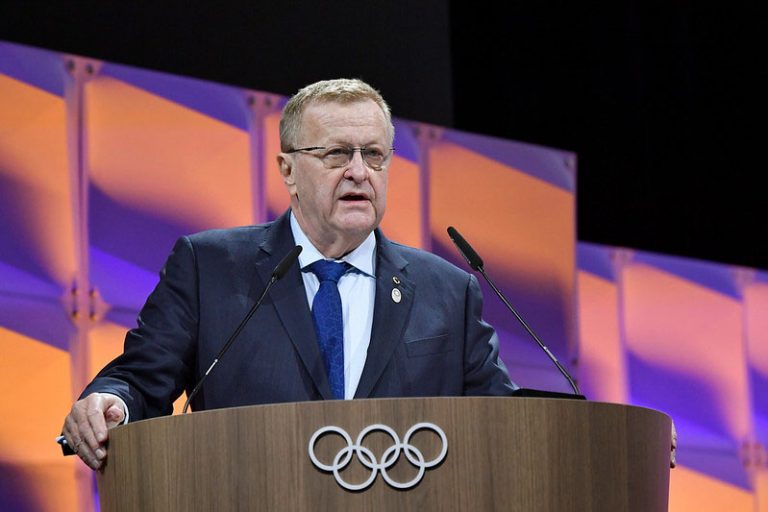BidWeek, Reporting From Toronto, Canada – I opened an email last week and discovered for the first time that a new NOlympics opposition group has formed, this time to campaign against a Denver 2030 Olympic bid.

The fledgling group formed by the Denver chapter of the Democratic Socialists of America seems to be using the tried and true modus operandi that has decimated Olympic bids around the world, and it has a yet-to-be-launched website and social media presence ready to wreak havoc on Olympic dreams.
I try to keep an open mind, I really do, but I just couldn’t prevent a smirk from forming on my lips when I discovered the new campaign.
Denver? Really? There needs to be a group to oppose that?
A word of advice to those trying to quash Denver’s Olympic aspirations: Don’t bother. Save your time, your money. Enjoy the spring instead.
The group launched with a press conference Friday ahead of an organized debate with proponents on Saturday morning. A photo released from the conference showed two young girls looking bored – maybe angry – flanking the podium and holding signs with the campaign slogan “Don’t Play Games With Colorado.”
Hey girls, shouldn’t you be in school? If not, why not go outside and play? Skiing, or skating could be fun.
The “Olympic bid market forces” have dictated that the IOC take a more reasonable approach to siting the Games in order to maintain the viability of staging the world’s most popular event.
Opposition or not, there is very little chance that the Games will be heading to Denver anytime soon. The United States Olympic Committee (USOC) could never make a mistake like that twice – or thrice.
Of course Denver is infamous for that time – the only time in Olympic history – that the city won its bid to host the 1976 Winter Games only to send them back to International Olympic Committee (IOC) headquarters in Switzerland a year later.
The city had second-thoughts and a lost referendum over publicly funding the event meant the 1976 Games went to Innsbruck, where the Games had been held eight years earlier, instead. It was Former Denver Governor Dick Lamm who organized that 1976 referendum and he’s back again pushing for a vote over a potential 2030 bid.
But that’s not even the problem here.
It’s about Boston.
In 2015 the USOC, in a move that is still undecipherable by Olympic observers, selected a bid from the Massachusetts capital over one from Los Angeles. In doing so it rejected a city with a strong Olympic legacy from 1984, a plethora of ready-to-use venues, and as high as 88 per cent public support.

Instead it chose a city with less than 50 per cent support and plenty of venues to build while residents were still reeling from a decades old misplanned transportation project called “the big dig.”
That decision blew up in everyone’s face when it became abundantly clear that a Games in Boston just wouldn’t fit.
In short – the USOC and Boston’s Mayor later agreed to cancel Olympic plans and Los Angeles, the original obvious choice, stepped back into the picture and became the new U.S. nomination to bid. In an historic decision LA was later awarded the 2028 Games with Paris getting the go-ahead for 2024.
I can’t imagine the USOC will make that mistake again when they choose a 2030 Winter Games candidate – something USOC Chief Larry Probst promised to do when I asked him during the PyeongChang Olympics.
Salt Lake City is currently all-in for 2030. The Utah capital has a strong Olympic legacy from its 2002 staging of the Games, a wealth of ready-to-use venues, and as high as 83 per cent public support. And it already has support from the State.
Reno-Tahoe also has a proposal in place, but here’s the thing – where is the the top sliding track in the U.S. – for Bobsleigh, Luge and Skeleton – a venue that no city would now dare to construct? In Park City, Utah – adjacent to Salt Lake City.

Could it get any simpler? Don’t worry NOlympics Denver – as long as Salt Lake City is in the picture, Colorado is not anywhere on the USOC’s radar. Get those girls back outside to enjoy what’s left of the winter season.
But it doesn’t seem like the opposition group really understands the dynamics here – to further bolster their cause they’ve leveraged Boston’s bid opposition guru Chris Dempsey who appeared on the panel at Saturday’s debate. Dempsey, who was extremely influential in the demise of Boston’s bid later went on to advise opponents in Hamburg, Rome and Budapest before those cities’ bids collapsed. He has also spoken to interested groups in Calgary and Salt Lake City.
Dempsey was so effective in unearthing the flaws in the Olympic bid process that the IOC has now completely changed the way it approaches its site selections, and cities vying to host the Games have developed projects in a new and more sustainable way. But the Bostonian still clings to his old arguments against hosting the Games that are now no longer relevant – and by his own doing.
Should Colorado seek Olympics, or should voters get a say first? Potential bid draws opposition before exploratory committee is finished https://t.co/i0ABUNx2jO
— The Denver Post (@denverpost) March 10, 2018
On Saturday Dempsey leveraged his go-to criticism used during the 2024 campaign, explaining that the Olympic bid process was the “world’s most expensive auction.” Maybe it was. But last year Los Angeles was chosen to host the 2028 Games after months of bilateral negotiations with the IOC, and without any opponents. LA, as part of an agreement where the city conceded the 2024 Games to Paris, actually received some concessions from the IOC for agreeing to host the Games 11 years hence. And there is no construction as part of LA’s plans – no new monuments to the Olympic movement beyond the legacies of past Games that have already paid dividends back to the city. That doesn’t sound like an auction to me.
Dempsey alluded that the IOC’s new rhetoric about changes that could make hosting the Games more economical and sustainable couldn’t be trusted, but didn’t discuss the actions that demonstrate the opposite.
The IOC has implemented real change to help keep costs down. Olympic officials told PyeongChang 2018 organizers not to build a costly sliding track and instead use facilities that already exist in Japan (an idea the Koreans ultimately rejected). The IOC coordination commission for Tokyo 2020 have worked closely with organizers to refine the venue plan, shaving billions off the cost of delivering the original plan.

Last year the IOC balked at a preliminary budget publicized by a Calgary 2026 bid exploration committee, and explained that under new reforms plans could be more cost efficient. After a site visit, the IOC said that a new arena need not be built to stage ice hockey and that the existing facility could be used instead.
The reality is, with less cities expressing interest in hosting the Games, and others lacking the will of its stakeholders to follow through with bids – the “Olympic bid market forces” have dictated that the IOC take a more reasonable approach to siting the Games in order to maintain the viability of staging the world’s most popular event.
Opposition movements have been the catalysts to these forces that will help the Olympic movement prosper for decades to come. Indeed, opposition, over the past decades, has played a key role in helping Games get effectively sited.
But these movements need to change as quickly as the IOC has; they need to sense the dynamics and understand the new landscape in order to remain relevant – and serve their constituents fairly and effectively. The Games aren’t right for every city, but in many cases the reasons are now different.
And NOlympics Denver. Really? Just ask bid proponents to have a quick, honest chat with the USOC leadership and be done with it.


